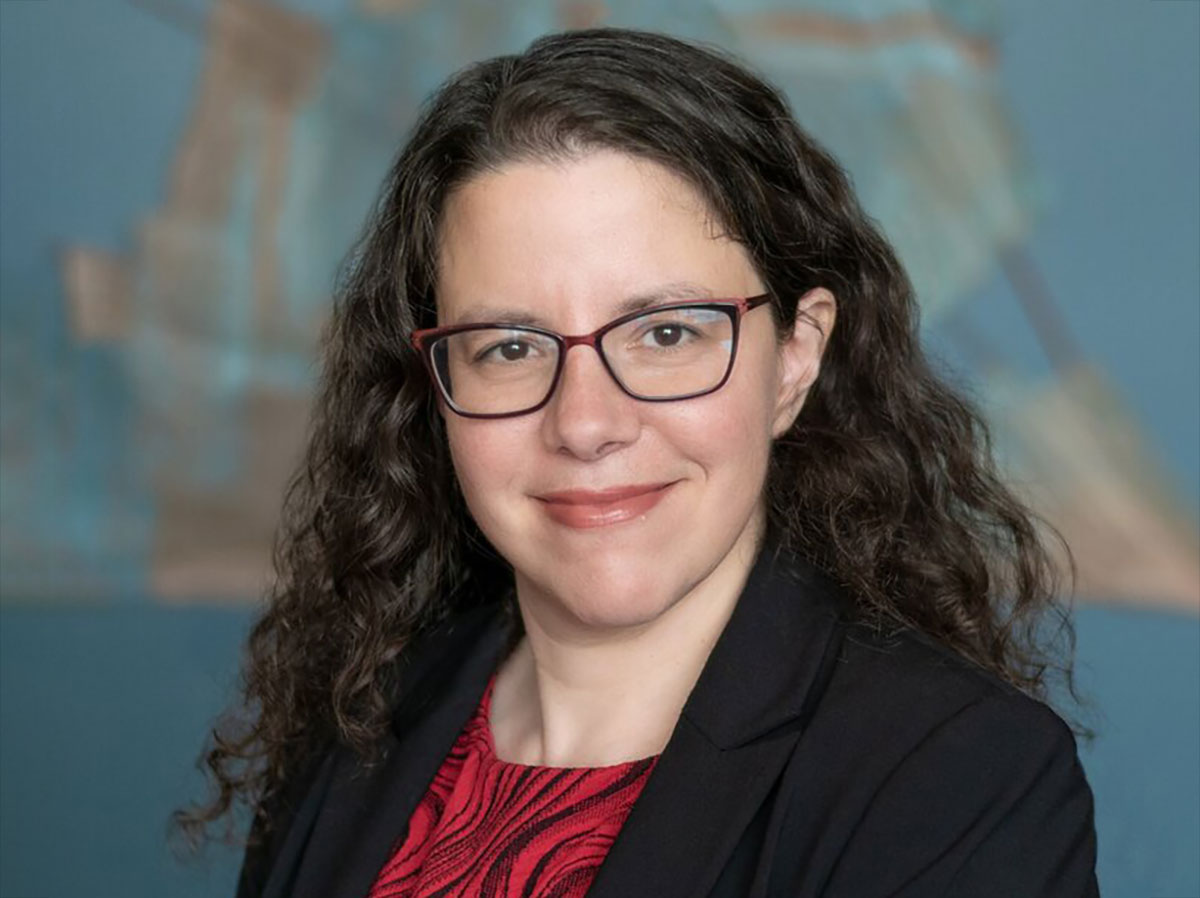
Feb. 16, 2022 – A determination that a Massachusetts lawyer committed misconduct last November by whispering to his client during a Zoom deposition was another reminder that changes forced by the pandemic can be a minefield for lawyers.
Stacie Rosenzweig, a Milwaukee lawyer with a practice focused on legal ethics and professional responsibility, said navigating that minefield has required lawyers to learn much during the last two years.
The switch to working from home was the first and, for some lawyers, the biggest change, Rosenzweig said.
“A lot of people, especially at the beginning of the pandemic, were scrambling – people weren’t necessarily living in places that lend themselves well to working from home.
"A lot of us lawyers were working out of corners of bedrooms that we shared with our spouses or partners … we were working out of our dining rooms.”
Her husband had been using the home office, Rosenzweig said. But he had to give it up and work in another room because the home office had a door and Rosenzweig needed privacy when she met virtually with clients.
A Learning Curve
Rosenzweig said that many of her lawyer clients face similar issues.
“There’s been a learning curve. I get a lot of questions about privacy in the home,” she said. “If your four-year old runs in needing help with the potty, does that blow attorney-client privilege?”
Like so many ethical dilemmas, the answers are often fact-specific.
For instance, said Rosenzweig, it’s clear that having her 11-year old son in the room during a client conversation would vitiate the privilege because he can write and repeat what he’d overheard.
“But what about a pre-verbal infant sitting on your lap while you’re having a phone call?”

“I get a lot of questions about privacy in the home,” says Stacie Rosenzweig, a Milwaukee lawyer with a practice focused on legal ethics and professional responsibility. “If your four-year old runs in needing help with the potty, does that blow attorney-client privilege?”
Whither the Cloud?
Potential waivers of the attorney-client privilege while working from home aren’t the only client information problem presented by the pandemic.
For instance, how do lawyers working from home safeguard their client’s data?
Some lawyers and law firms switched to cloud computing, which involves backing up data to remote servers, before the pandemic struck. Others moved to cloud computing after the pandemic hit, to enable lawyers to work remotely.
The State Bar of Wisconsin addressed cloud computing in 2017 in Wisconsin Formal Ethics Opinion EF-15-01, said Tim Pierce, ethics counsel for the State Bar.
“The provider of cloud computing adds a layer of risk between the lawyer and client’s information because most of the … safeguards are managed by the cloud service provider,” the opinion reads. “Yet the ultimate responsibility for insuring the confidentiality and security of the client’s information lies with the lawyer.”
‘Like a Storage Locker’
The gist of the opinion, Pierce said, is that a lawyer can use cloud computing as long as he or she makes a reasonable effort to address the risk associated with it.
“Basically, it’s the same as renting a storage locker somewhere. Yes, you can store client information in a facility owned by somebody else, but you’ve got to do your due diligence and be able to articulate the reasons why you think it’s safe to store stuff there.”
The move to cloud computing followed other changes in how lawyers used technology – changes often inspired by mishaps with ethical implications.
For instance, emailing documents meant for a client to opposing counsel instead, because of the auto-fill function kicking in when entering a name in the “To” field.
Many law firms disabled auto-fill on their computers as a result of such snafus, Pierce said.
According to Pierce, staying out of ethics trouble in the new tech-heavy world requires more than just reading the relevant rules, which by necessity are couched in generalities.
“There’s nothing in the rules of professional conduct that says you can or you can’t use cloud storage to store client information, but you have to educate yourself about how the technology works.”

“Secondary sources of authority – primarily bar ethics opinions – and a smattering of disciplinary cases will elaborate on what the general principles in the rules might mean to the state of technology as it exists today.” says Tim Pierce, ethics counsel for the State Bar of Wisconsin.
Paranoid?
Rosenzweig counsels lawyers working virtually to be careful about devices other than their PCs sending data into the cloud. For instance, remote speakers like Amazon’s Alex and Apple’s Siri.
“Depending on how you have them set up, they can be always on and alert and listening for keywords…they’re programmed to jump into action," she said.
Some privacy advocates recommend placing such devices at the opposite end of the house from a home office.
“And that may sound paranoid but at the same time there isn’t a set expectation of privacy there,” Rosenzweig said. “These things might be recording.”
The issue of remote speakers is a good example of a technology that should send lawyers back to the disciplinary rules, regardless of how long the pandemic lasts or what new technologies arise.
“It doesn’t say that you have to be an expert on all things tech, but you have to stay aware of the risks and benefits of technology,” Rosenzweig said. “And that’s going to hold for things that stay and that things that may be transient due to the pandemic.”
Silver Lining?
Rosenzweig said many of the tech-related ethics issues she comes across in her practice have less to do with new technology and more to do with the adoption of existing technology.
 Jeff M. Brown is a legal writer for the State Bar of Wisconsin, Madison. He can be reached by email or by phone at (608) 250-6126.
Jeff M. Brown is a legal writer for the State Bar of Wisconsin, Madison. He can be reached by email or by phone at (608) 250-6126.
According to Rosenzweig, that’s not always a bad thing. She cites the adoption of Zoom for court hearings during the pandemic as a boon that saved attorneys travel time and saved clients costs.
“Even just a couple of years ago, we had to go in-person for scheduling conferences because the judge wanted to see everybody in-person, and depending on the county it didn’t even matter how far we had to travel. They wanted us there in-person for things like scheduling and status, regardless. That was their policy.”
She said the change could help ameliorate the access to justice issue faced by would-be clients in Greater Wisconsin, which has for several decades struggled to attract lawyers.
Fewer lawyers would need to move up north to serve clients if they could do so virtually from cities in the southern part of the state.
“I would be more likely to take a case in Vilas County if I knew my 15-minute scheduling conference would be 15 minutes and not a whole day of driving and there and back or a hotel night if I had to be there early the next day.”
Benefits of Virtual Hearings
Virtual hearings have benefits beyond time and cost savings.
Rosenzweig said she prefers appearing at motions hearings virtually, because dual monitors allow her to be more efficient and responsive than she would be sitting at a counsel’s table with sheaves of paper and a laptop.
“I can have my hearing points up on the screen where my camera is posted so I’m looking right at the camera, and I have on the other screen the entire case file viewable, and it’s a lot easier to find documents when everything is electronic, at least for me.”
Rosenzweig, who co-chairs the Milwaukee Bar Association’s court committee, said she thinks that remote appearances are here to stay.
“Most people really seem to like remote appearances, at least for routine matters.”
Effect on Hotline Calls
Pierce said he’s noticed only a slight rise in calls to the State Bar’s ethics hotline since the pandemic began. He said he thinks much of the education about the tech-related ethics issues raised by the pandemic was provided by practice groups and State Bar sections.
One issue the State Bar did directly provide education on was notarization and authenticating electronic signatures.
“That has nothing to do with the rules of professional conduct, but it had a lot to do with other areas of law,” Pierce said.
“So we had these town halls for practice-specific groups early in the pandemic, and there was a lot of talk among the estate planning lawyers about how you get estate planning documents signed when you can’t come into physical contact.”
Ask Us!
Questions about ethics or practice management? Confidential assistance is a phone call or click away:
Ethics Hotline: (800) 254-9154, or (608) 229-2017
9 a.m. to 4 p.m., Monday through Friday.
Practice411™: (800) 957-4670, or
practicehelp@wisbar.org
Other Changes
Pierce said he thinks tech issues raised by the pandemic will lead to a change in Wisconsin’s ethics rules for electronic payments to lawyer trust accounts, which he called “by far the most complicated trust account rule in the country.”
“What I think you will see is the Wisconsin trust account rule become less tech-specific and more like the other disciplinary rules. I think all that complication in the Wisconsin rule over electronic payments is probably going to go away in the next few years.”
If such a change occurs, Pierce – who teaches professional responsibility at U.W. Law School – hinted that demographics would be as big a driver as technology.
“Lawyers who are 23 or 24 years old, it would never occur to them that you can’t pay by Venmo. I have students in my law school class who, some of them, have never written a check. They’ve never had a checkbook.”
How Will it Shake Out?
Rosenzweig said she’s only now beginning to handle professional discipline cases with aspects that wouldn’t have arisen before the pandemic because “discipline is a lagging indicator.”
“It will be interesting to see how it shakes out,” Rosenzweig said, “but it may be a bit before we know.”
According to Pierce, part of that shaking out will be cases working their way through the disciplinary process.
“Secondary sources of authority, primarily bar ethics opinions, and a smattering of disciplinary cases will elaborate on what the general principles in the rules might mean to the state of technology as it exists today.”
But, said Pierce, “the actual black letter disciplinary rules will continue the tradition of stating general principles.”
